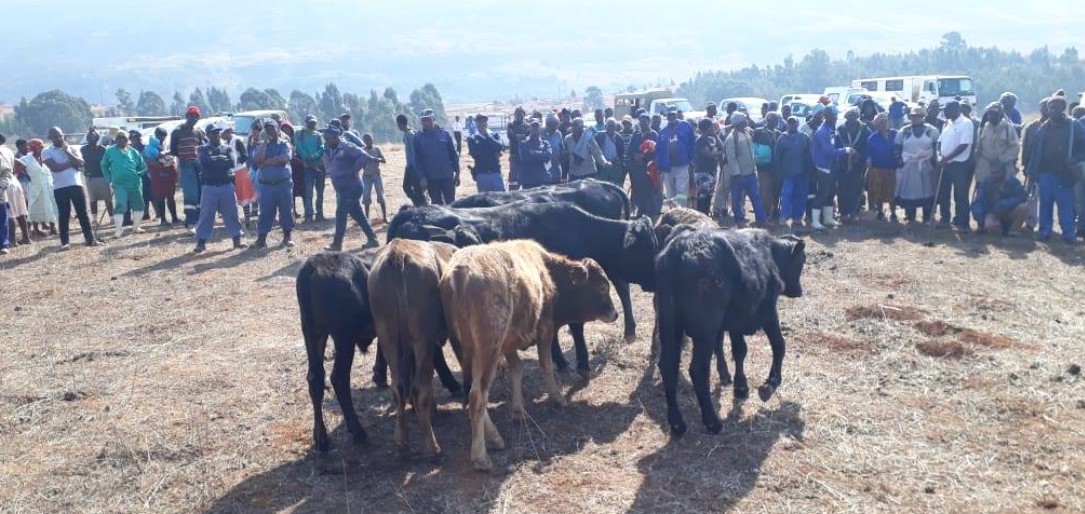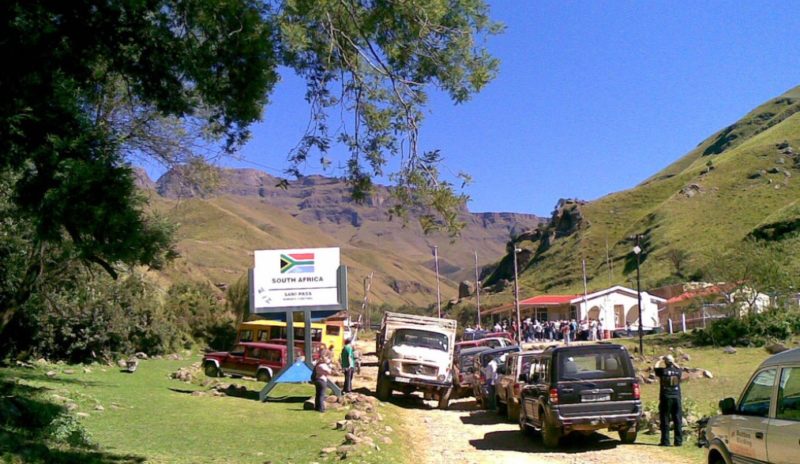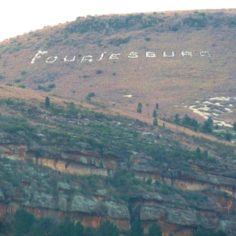 Stock theft investigation by SAPS. The corrupt South African police are working together with the farm attackers. Photo: SAPS
Stock theft investigation by SAPS. The corrupt South African police are working together with the farm attackers. Photo: SAPS
Farmers say horrific murder in Free State could have been prevented
Farmers in the Eastern Free State say the horrific murder of Brendin Horner could have been prevented if a detailed report had been considered in which the suspected members of transnational stock theft syndicates had been identified.
Published: October 11, 2020, 10:37 am
A group of about 30 farmers marched on the courthouse on Tuesday and a police van was overturned and caught fire when the police tried to ram into the group. One of the alleged participants, a 51-year-old former farmer and now a construction contractor, André Pienaar, appeared in court on Friday morning on charges of terrorism, attempted murder, incitement to violence and public violence. He has not been identified in the South African media in terms of a court order. Pienaar’s bail application was adjourned until Tuesday.
In a speech before the court on Tuesday, the farmers, including Pienaar, had challenged the Minister of Police, Bheki Cele, to ask the Hawks about the report “on Paul Roux’s corrupt police” which he had already been given in January.
Herkie Viljoen, safety chairman of the Bethlehem District Agricultural Association, which operates a 24-hour control room for the region in the town, told Sunday newspaper Rapport that Horner was killed “because people did not do their job”.
“What did they do with that report? If they did their job. . . if they had acted on what we had proven to them in black and white. . . the gang that has been terrorizing us for two years now, then that gang could not do what they did on Friday morning,” Viljoen said.
He said farmers want the police to appoint a national task team within a week to investigate stock theft in the Eastern Free State and the local police’s involvement in it.
The incriminating report was handed over to a lieutenant colonel in the Hawks months ago. The Hawks are South Africa’s Directorate for Priority Crime Investigation (DPCI).
The real problem appears to be Lesotho. This enclaved British Bantustan, has always been a safe haven for stock thieves. The thieves simply cross the border with their loot.
Curiously, together with another British Bantustan Swaziland, which also happens to be an absolute monarchy, these two small ethnic countries in Southern Africa survived the international onslaught against Apartheid. While the Bantustans in South Africa were dismantled and the land handed over to ANC-supporting tribal chiefs, Lesotho and Swaziland somehow never caught the attention of the international Anglophone media.
The South African and Lesotho police’s joint Operation Servamus in August 2019 resulted in the seizure of only 117 stolen cattle, 107 stolen goats, four sheep and seven horses.
Regarding cross-border raids between South Africa and Lesotho, the stolen animals are hidden along the mountainous border, rebranded and sold back to South Africans. The stolen animals are laundered through stock auctions.
The lack of border security contributes to the problem. Large parts of the border fence and fence poles have been stolen. This has created opportunities for criminals to smuggle livestock, drugs as well as firearms across the border.
“With livestock theft comes the problem of drug trafficking accompanied by increasing levels of violence,” a senior law enforcement officer in Lesotho told ENACT on condition of anonymity.
In addition to stealing animals, armed criminals attack farmers. Many of these cases are not reported to the police, primarily due to fear of reprisal. The attackers often set alight grazing or even whole farms. In 2014, the Eastern Free State lost more than 100 000 ha of pasture destroyed by arson.
“In September 2019, we started by talking to police stations in the district. We did not receive any reply. Then we went to the (provincial) clusters. Again, no reply.” Viljoen then sent the report to a lieutenant colonel of the Hawks in Pretoria – the first was sent in December and a follow-up report containing even more detail was sent in January. He has yet to receive a reply.
“When I asked him two weeks ago what was going on, because things were getting worse in Paul Roux, he said the report was scheduled to go to the next level. But he never got back to me.” Viljoen says the farmers are convinced that some local policemen have been working together with stock theft syndicates.
“Often we catch people stealing sheep and acknowledging everything. Then the police come to fetch them and by the time they arrive in town, the cattle thieves suddenly ‘remember nothing’.
“Two policemen, a sergeant and a constable, strolled around town boasting that they did not touch their police salaries, because the cattle thieves pay them so much more.” Many farmers approached by Rapport told the same story.
One explained that the police “educated” the accused on what to say when they are caught and have to appear in court. “They would say, for example, that the farmer aimed a firearm at them or used the k-word [a racial slur]. Then the farmer’s weapons are confiscated,” explained one farmer, who did not want to be identified.
According to sources, stock thieves chase herds of sheep of up to 35 through the field at night, crossing the border into Lesotho. The only hope farmers have of ever finding their livestock is to look for it themselves. “We are no longer farmers, we are now the stock theft unit.”
The farmers who have tried to alert the media about the scourge, have allegedly been threatened by the police to keep quiet.
The report contains details of how stolen livestock had been found on a farm belonging to a police general. A herdsman was arrested who eventually died in the cells and the investigating officer was soon transferred to another station.
A station commander in one Eastern Free State town has repeatedly been seen under suspicious circumstances near farms where cattle have just been stolen. When confronted, he claims to be “on patrol”. The report contains the details of six theft cases – complete with case numbers – to which this particular station commander is directly connected.
Several other policemen believed to be involved are even identified by name in the report.
According to the report, between April and August 2018, 845 cattle were stolen in the area (which includes the towns of Clarens, Bethlehem, Fouriesburg, Paul Roux and Kestell). No arrests were made in these 99 cases. Between April and August last year, the thefts almost doubled: 1 538 cattle were stolen, of which only 186 were recovered. Only one person was arrested in these 137 cases.
Some farmers have lost as many as 200 sheep in a single night.
However, the report, which includes the names of senior police officers who are believed to part of the syndicates, photos of suspicious vehicles and their registration numbers and even the names of people with inside knowledge of the corruption and who would be willing to speak, has been ignored by Pretoria.
Numerous agricultural leaders have admitted that the reluctance of the police to act and the firm belief that senior police officers in the area were involved in the crime, were some of the reasons why thousands of farmers had gathered for the court appearance on Tuesday of two suspects arrested for the murder of Horner (22).
There were 29 672 counts of stock theft in South Africa in the 2018-19 financial year. This is almost a 3 percent increase from the previous year, where 28 849 cases were registered. These South African Police Service annual crime statistics show that stock theft is on the rise.
Contrary to the notion that stock thieves steal for food, Willie Clack, a penologist at the University of South Africa, told ENACT that “87 percent of livestock theft involves some form of organised crime while only 13 percent is for survival”.
Horner, who was described by his boss, Gilly Scheepers, as “a good, peace-loving boy who could have become another top farmer”, was allegedly attacked by cattle thieves at a farm gate when he caught them in the act. He was strangled with a nylon rope and his body hung on a fence post. He had been stabbed several times and the knife used in the stabbing was left next to him as a warning.
The Hawks’ national spokesperson Hangwani Mulaudzi meanwhile said he did not know of any such report. Police station commander Mokete Moloi on Paul Roux last week rejected allegations that police were involved in stock thefts. He made an appointment with Rapport on Friday morning to meet him at the Paul Roux police station, but never showed up.
All rights reserved. You have permission to quote freely from the articles provided that the source (www.freewestmedia.com) is given. Photos may not be used without our consent.
Consider donating to support our work
Help us to produce more articles like this. FreeWestMedia is depending on donations from our readers to keep going. With your help, we expose the mainstream fake news agenda.
Keep your language polite. Readers from many different countries visit and contribute to Free West Media and we must therefore obey the rules in, for example, Germany. Illegal content will be deleted.
If you have been approved to post comments without preview from FWM, you are responsible for violations of any law. This means that FWM may be forced to cooperate with authorities in a possible crime investigation.
If your comments are subject to preview by FWM, please be patient. We continually review comments but depending on the time of day it can take up to several hours before your comment is reviewed.
We reserve the right to delete comments that are offensive, contain slander or foul language, or are irrelevant to the discussion.

South Africa’s infrastructure 30 years after the end of Apartheid
LondonHating South Africa was part of growing up in North London in the 1980s. Pelle Taylor and Patrick Remington from Two Raven Films, recently interviewed South Africans about the decline of the country after Apartheid ended.

Nigerian President: More weapons for Ukraine end up in Africa
LagosSome time ago, FWM reported on arms deliveries to Ukraine, which shortly afterwards were resold on the Internet. Nigerian President Muhammadu Buhari has warned that "weapons used in the war in Ukraine are gradually leaking into the region" and called for strengthened border security.

Namibia sees opportunity to attract German energy refugees
Windhoek"The former German colony, Namibia wants to help Germany in its energy crisis". This is how an article in the online edition of a German newspaper recently began about Namibia's new "Digital Nomad" visa. The six-month visa is ideal for long-term holidaymakers. And for professionals who have their office on their laptop and can work from anywhere.

Uneven global population growth reaches 8 billion
According to the United Nations Population Fund (UNFPA), we celebrated the 8 billionth day* on November 15. The planet's population is still increasing dramatically, albeit at a decreasing pace.

French fuel debacle spills over to Senegal
DakarThe recent events at the French embassy in Burkina Faso were yet another demonstration against France on the African continent after France was ousted from Mali. All it took was a rumour to attract the sympathy of the population and demonstrators to head to the French Embassy.

New South African drone to compete with Turkey’s Bayraktar
PretoriaThe South African defense company Milkor unveiled its Milkor 380 reconnaissance and attack unmanned aerial vehicle (UAV). It is expected to become a competitor to Turkey's Bayraktar and Anka drones.

Bucking the trend: Uganda bans work by LGBT group
KampalaThe Ugandan government has banned the activities of a local non-governmental organization that campaigns for the rights of sexual minorities. According to a senior official, the organization worked illegally in the African country.

South Africa: 82 suspects arrested after a mass rape
KrugersdorpDozens of black men ambushed a film crew at an abandoned mine near Johannesburg on Friday. They raped eight models between the ages of 19 and 35. As they fled, the police shot dead two suspects and 82 other people were arrested.

BRICS expansion on the cards
More and more emerging countries are considering joining the BRICS group, which is seen as the major emerging countries' counterweight to the US-led West and the G7. Especially in times like these, this is also a clear signal to Washington.





3 comments
SAPS work methodology:
mañana mañana
Not really. The police have been very diligent in helping Prince Ginger’s cohorts.
All you need to know about Lesotho:
https://www.goodmorningamerica.com/culture/story/prince-harry-makes-emotional-private-visit-charity-56122100
His handler Adam Bidwell was also with Prince Ginger during his holiday in Las Vegas capturing his ‘naked billiards’ game at his hotel.
By submitting a comment you grant Free West Media a perpetual license to reproduce your words and name/web site in attribution. Inappropriate and irrelevant comments will be removed at an admin’s discretion. Your email is used for verification purposes only, it will never be shared.